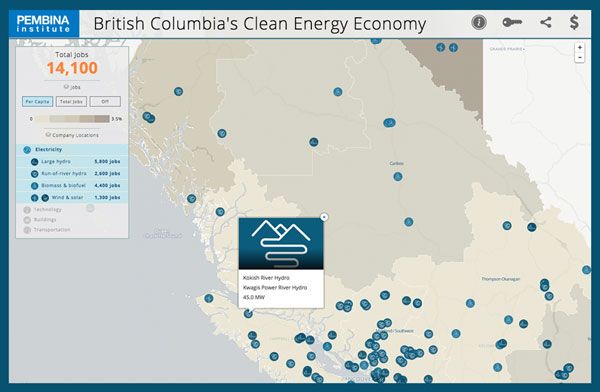
If there’s one sector that British Columbia can do more to support in pursuit to build a strong, diverse and resilient economy, it’s the clean energy sector.
The Pembina Institute has crunched the numbers and found over 14,100 jobs from clean energy in B.C. It has also pinpointed these jobs on a new interactive map that allows users to explore 156 clean energy projects currently in operation or under construction.
Far from a “boutique” sector, renewable energy employs people in our biggest cities and our most remote communities, including many First Nations. While it may come as no surprise that many of these jobs are located in the Lower Mainland, on a per capita basis the highest concentration of jobs are found in the Northeast — a region that typically struggles with a lack of diverse employment opportunities and boom-and-bust economic cycles.
These projects include wind and solar power, run-of-river and large hydro, biomass and biogas — all of which are powered through renewable sources, have relatively small carbon footprints and contribute most of the energy to our electricity grid.
And renewable energy is only a small part of the clean energy economy, which includes technologies and services that have measurable environmental benefits in terms of reducing carbon pollution and improving energy efficiency.
Despite the numerous benefits offered by the clean energy economy, including its significant export potential, it is often underestimated or overlooked by the province in favour of conventional industries, such as fossil fuel exports (think liquefied natural gas). These industries are not exclusive of one another, but our current economic development plans tend to favour conventional energy sources and exports over growing the clean energy economy.
There are a host of reasons why policies that prioritize clean energy can help future-proof B.C. and make British Columbians from all parts of the province much better off in the long run: clean energy is much better for the environment with a fraction of the carbon footprint of conventional sources of energy; it can help prepare our province for changing market conditions that favour low-carbon energy solutions; and an over-reliance on fossil fuel exports is risky at a time when other countries and regions are considering fossil fuel-limiting policies.
That’s not to disregard the fact that B.C. has already introduced some forward-looking climate policies, like the carbon tax and the clean energy requirement for new electricity produced in the province. Both have helped to make the business case for investments in renewable energy and laid the groundwork for clean energy companies in the province.
But those policies were introduced in 2008 and 2010, respectively, and progress has since stalled. Expanding on policies like the carbon tax or introducing new ones will help spur the kind of growth in clean energy technology and services needed for our province to develop a robust clean energy economy — one that would be capable of competing in the global clean energy market.
And with global climate talks in Paris approaching and a commitment from the province to move forward with a new climate action plan, it’s the perfect time to accelerate development of B.C.’s clean energy economy.
As the map demonstrates, renewable energy projects not only contribute a significant number of jobs throughout the province, but couple economic growth with strong environmental protection and reducing carbon pollution.
B.C. needs to go further faster with clean energy in order to meet our climate targets, adapt to a climate-friendly political landscape and grab a share of the growing clean energy export market. Supportive policies will help.
Penelope Comette is the director of the Pembina Institute’s clean energy economy research in British Columbia.
Dr. Judith Sayers is a Strategic Adviser to First Nations and corporations, an adjunct professor with the Peter Gustavson School of Business and former elected Chief and Chief Negotiator of the Hupacasath First Nation
Penelope was a program director with the Pembina Institute and led the Pembina Institute’s Ombuds Office until 2018.




